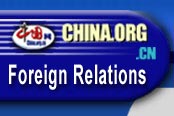Chinese reporters interviewed Foreign Minister Tang Jiaxuan on December 10 upon the conclusion of his formal visit to the four countries in Central and Eastern Europe.
Tang said that, from December 2—10, at the invitation of Foreign Ministers of Yugoslavia, Albania, Hungary, and Poland, he paid a formal visit to the above-mentioned four countries.
During the visit, he held talks with the Foreign Ministers, Presidents, Prime Ministers, and Speakers of the Parliament of the four countries, had a comprehensive and in-depth exchange of views with them on bilateral relations and regional and international issues of common concern, and reached consensus on many major issues.
China signed and issued joint communiqu?s or joint statements with Yugoslavia, Albania, and Hungary.
His visit to the four countries at the turn of the century serves the purpose of deepening understanding, enhancing trust, promoting cooperation, and pushing China’s relations with Yugoslavia, Albania, Hungary, and Poland to further develop in the new century.
Tang said that Yugoslavia, Albania, Hungary, and Poland are among the earliest countries that recognized the People’s Republic of China and have half-a-century friendly relations and cooperation with China. Tang remarked that during the visit, he felt deeply that China has a solid foundation with the four countries in terms of developing friendly relations.
Although the four countries focus their foreign policy on the European integration, they also attach importance to China’s international status, admire the great achievements in China’s economic development, and express the willingness to conduct the mutually beneficial cooperation with China in various areas.
The governments of the four countries explicitly reiterated their adherence to the one-China position, recognize the government of the People’s Republic of China as the sole legal government representing the whole Chinese people, Taiwan is an inalienable part of China’s territory and refrain from establishing official ties or official exchanges with Taiwan.
China and the four countries share common interest in a number of major issues such as maintaining peace in the world and promoting economic development.
To maintain and develop friendly relations and cooperation with the four countries is in the fundamental interests of the peoples of China and the four countries and conducive to regional and world peace and stability.
One of the important agreements achieved by the leaders of the four countries and Tang is to promote bilateral relations more actively and bring them to a new high in the new century.
Tang said that in recent years, great changes have taken place in the international situation and domestic situations in China and the four countries. The Chinese government always respects the choice made by the people of different countries and does not interfere in their internal affairs.
He explained the position to the leaders of the four countries and they agreed with him. The new leader of Yugoslavia said that the change in the domestic situation in Yugoslavia would not affect the normal development of China-Yugoslavia relations and bilateral relations would not plunge below the best historic level.
At the same time, the world is a colorful and diversified one. All countries differ in terms of history, culture, and national realities. It is but natural that we have different views with these four countries on certain issues.
During the visit, Tang noted that the difference should not become the obstacle to developing bilateral relationships.
The two sides concerned should seek common ground while shelving differences, override the gap in terms of social systems, ideology, and value systems, adhere to the Five Principle of Peaceful Coexistence, and promote bilateral relations to develop in a long-term, stable, sound and comprehensive manner. The leaders of the four countries expressed agreement gladly.
Tang said that China and the four countries are ready to further expand and strengthen exchanges and cooperation between them in all areas and at all levels. Economic relations and trade are an important part of state-to-state relations and the foundation to develop political relations.
The four countries expressed a strong desire to strengthen economic cooperation and trade with China.
At present, the trade between China and the four countries are developing steadily, but there are issues such as limited trade volume and ways of cooperation and trade imbalance.
Generally speaking, economic relations and trade still lag behind political relations therefore there is more potential to tap. All these countries are greatly concerned about that.
The leaders of the four countries and Foreign Minister Tang explored ways to further develop economic cooperation and trade between them. The various sides agreed that they should further strengthen cooperation between the economic and trade departments and the business communities, enhance understanding of each other’s market, explore new ways and means of cooperation, and further promote the development of bilateral economic relations and trade.
It is believed that the prospect of economic cooperation and trade between China and the four countries is bright.
Tang said in conclusion that the visit is successful and productive and has helped to create a new and good opportunity for the further development of bilateral relations.
(China Foreign Ministry 12/10/2000)
